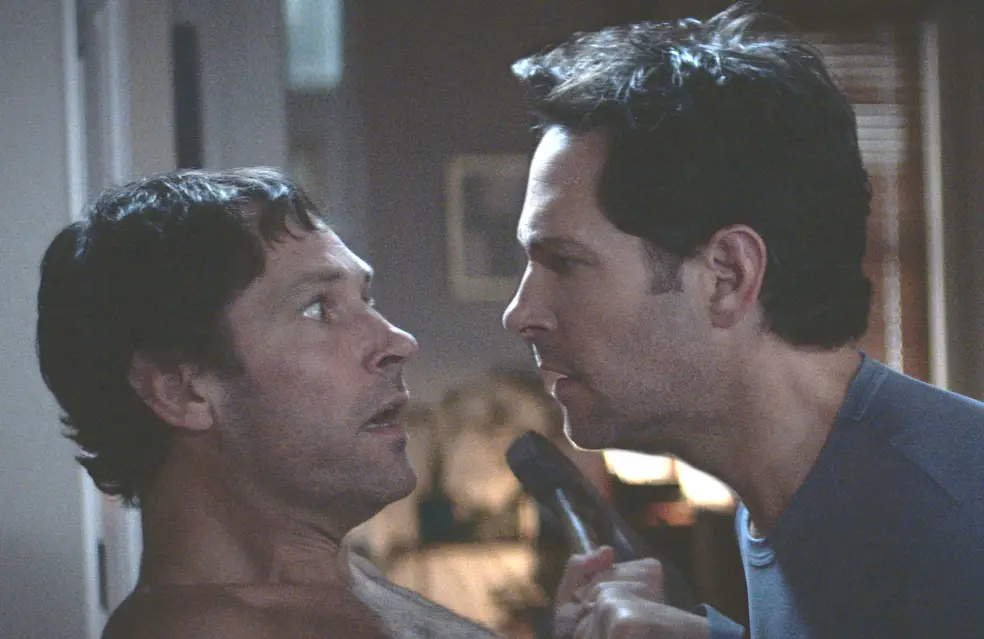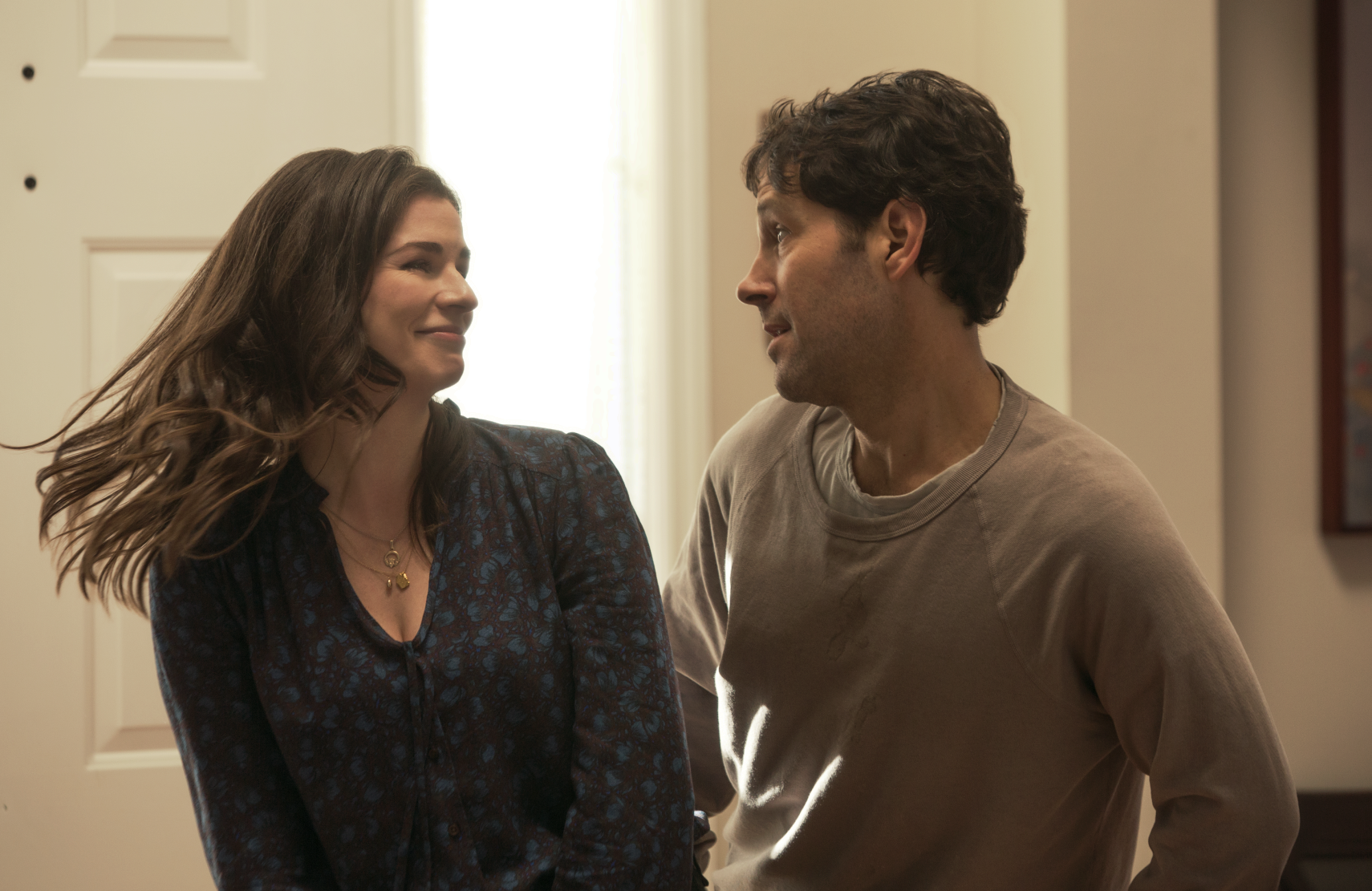Paul Rudd Makes Living With Yourself Twice As Nice
-
 Paul Rudd stars opposite himself in the mind-bending new comedy, Living With Yourself. (Netflix)
Paul Rudd stars opposite himself in the mind-bending new comedy, Living With Yourself. (Netflix)Is there anything Paul Rudd does poorly? Around Kansas City, where I live and where he's claimed as a native son, the answer is no. Not only does he play the greatest Avengers hero (subject to debate), Rudd is a local superhero, returning here every June and raising money for charity with other KC-boys-made-good.
(Here is a true story. In 1997, shortly after I arrived in Kansas City to cover the TV beat, Gloria Rudd, then sales manager for Channel 62, was introduced to me as “Paul Rudd’s mother.” I smiled and gave it my best “oh!”, but Gloria, who like Paul’s dad is English, knew phony enthusiasm when she saw it. Indeed, I was clueless that her son was in Clueless, though I’d seen the movie and reviewed the show. He wasn’t yet famous outside the 913 — just a handful of small-to-medium roles in TV and film, including a miniseries set in the year 2017, when global warming turns the earth into a blazing hellscape. Anyway, Gloria never spoke to me again.)
But you don’t have to be a homer to conclude that Paul Rudd is almost certainly incapable of screwing up a role, whether he’s starring in Marvel movies or, as Zach Galifianakis recently put it, “stuff that nobody’s ever heard of.”
Which brings us to Living With Yourself, a dark Netflix comedy you probably have been hearing about. It’s being touted as Rudd’s first starring role in television, which is technically true, but discounts Rudd's illustrious television work.
In Living With Yourself, Rudd plays a miserable wretch named Miles who decides to reboot his life and his unhappy marriage to Kate (Ainsley Bea), by undergoing a sketchy $50,000 gene-therapy treatment at a strip mall spa. Voila, he is turned into a much more charming, competent, wife-pleasing version of himself — New Miles. Just one problem: Old Miles is still around. He was supposed to be killed off and buried in a shallow grave. Instead, he survives and finds his way home.
Dual roles crop up occasionally in TV shows, usually soap operas (Yael Grobglas was so convincing as Petra’s archrival sister in Jane the Virgin that it took a while for me to realize it was the same actor playing Petra). But they're usually stunts that don’t take up the whole show. Not true with Living with Yourself, where the two biggest parts belong to Paul Rudd and... Paul Rudd. Old Miles and New Miles get most of the screen time (or should I say greenscreen time) because the show revolves around their predicament.

And what exactly is that predicament? On the surface, it’s logistical. New and Old Miles have only one house, one iPhone, and one wife between them. Either they’re going to have to let Kate in on their secret or one of them will have to leave town.
But which one stays and which one goes? That’s the $50,000 question. After all, New Miles is a huge upgrade over Old Miles, and they both know it. He’s Miles 2.0, marching into his ad agency with a bounce in his step, improvising a sales pitch that would make Don Draper weep. He goes home and is a model husband to Kate. He doesn’t even need glasses anymore. By all appearances, he’s made Old Miles obsolete.
But appearances are deceiving. A conversation in the car about youthful memories makes New Miles aware that the things he remembers so well actually happened to another person. In one telling scene, he has Old Miles pull up his shirt. New Miles recalls having an appendectomy long ago, but only Old Miles has the scar to prove it. In another scene, New Miles blurts out in a crowded diner, “I’ve never been laid!”
Like many a flawed hero, Old Miles has a fall from grace that makes him realize there are worse things in life than having a stressful, high-paying job and a beautiful, successful wife. Is he willing to fight to get his old life back? Meanwhile, it begins to dawn on New Miles that he hasn’t done a damn thing in his brief few days on earth. What’s he willing to do to find meaning and purpose in what’s essentially someone else’s body?
The execution of Living with Yourself is mostly brilliant. These eight half-hour episodes go fast. If I have a quarrel with the show, it’s that too much time is spent on the admittedly rich storylines that can be developed from this premise. For my liking, not enough time is spent on the reason Miles went to the strip mall spa in the first place. He wanted a shortcut out of his problems. But the real satisfaction in life comes from doing the hard work to become a better person. (You don’t need a Netflix algorithm to know this show is going to appeal to fans of The Good Place.) But because Living with Yourself is only eight episodes, and there’s so much storyline to work through, this meaty material is largely left untapped.
That’s a small quarrel. Really, you should watch Living With Yourself for Paul Rudd and... Paul Rudd. A role like the two Mileses requires a surprising amount of emotional range, and Rudd’s got it. From middle-age angst and self-loathing to the elation of new life to the sadness of unlived memories and the weirdness of feeling white-hot rage for a person who is biologically your double — Rudd pulls these moods off so convincingly, you wonder if there’s another one of him running around.
Just to be on the safe side, I checked my newspaper’s archive. There actually was an earlier Paul Rudd who appeared in movies in the 1960s and ’70s, but only one who fits the description, and we had our eye on him early. Here’s a story from his senior year in high school: “Rudd has found a home in the comfortable unconventionality of the anything-goes forensics class,” wrote my old colleague Jim Fussell. “Forensics, a combination of speech, drama, and debate, has helped Rudd develop enough self-confidence to do just about anything in front of just about anybody.”
Including, now, himself.
Are you watching Living With Yourself? Strike up a conversation with others doing the same in our forums.
Aaron Barnhart has written about television since 1994, including 15 years as TV critic for the Kansas City Star.
TOPICS: Living With Yourself, Netflix, The Good Place, Paul Rudd